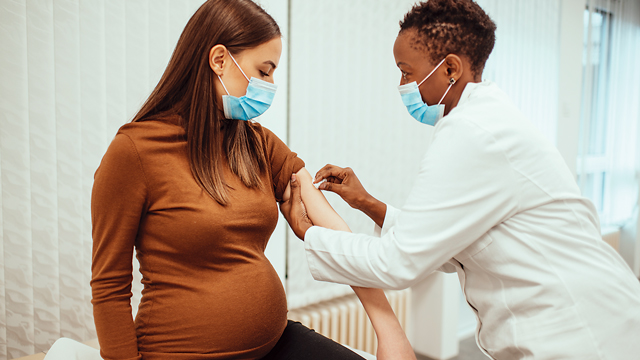Pregnancy is a unique experience with many variables that can leave you feeling overwhelmed. I understand. I am also pregnant. When the COVID-19 vaccine first became available to healthcare providers in December 2020, my husband and I weighed the risks and benefits of getting vaccinated versus the risk of COVID-19 infection on our future fertility and pregnancy. Ultimately, we felt the decision was clear: COVID-19 infection conferred more risk of severe complications than vaccination.
This fall, when the booster became available to me at thirty weeks pregnant, I did my research again. I turned to trusted resources that guide me in my care for my patients: the American College of Obstetricians and Gynecologists and the Society for Maternal-Fetal Medicine. Both recommended booster vaccination for pregnant women who had completed a vaccine series six or more months prior.
Having seen so many people with COVID-19, I feel strongly about the importance of vaccination during pregnancy and welcome questions and concerns regarding the COVID-19 vaccine. I’d like to share answers to some frequently asked questions:
Does the COVID-19 vaccine affect fertility?
No. There is no increased risk of miscarriage or infertility in women or men associated with the vaccine. The American Society for Reproductive Medicine now recommends that people undergoing fertility treatment get vaccinated.
What are the risks for pregnant people with COVID-19?
We are seeing that pregnant patients are at a much higher risk of COVID-19 complications than those who are not pregnant. Increased complications include pre-eclampsia, preterm birth, gestational diabetes, and low birth weight, with ongoing concern for increased risk of stillbirth. Pregnant people are also at a higher risk for ICU admission, intubation, and death than non-pregnant people.
Can COVID-19 be transmitted from mother to baby during pregnancy?
This is an area of ongoing study. Most newborns whose mothers had COVID-19 during pregnancy do not have COVID-19 when they are born. However, some infants have tested positive shortly after birth, and it is still unclear if these infections were acquired during pregnancy, during delivery, or after birth. Of the newborns testing positive, most had mild or no symptoms, although some reports show severe illness in newborns.
Is it safe to take the COVID-19 vaccine during pregnancy?
Yes. Numerous studies show that the vaccine is safe and effective for women pursuing pregnancy, who are pregnant, and who are breastfeeding. Evidence shows that the vaccine helps mount an immune response and development of antibodies that pass through the placenta and breastmilk to aid your baby in fighting future infection. The medical community has found that COVID-19 vaccination does not increase risk of miscarriage or adverse pregnancy outcomes, and that it does prevent hospitalizations and severe disease in pregnancy.
Which COVID vaccine is best for pregnant women?
Per the CDC recommendations, either of the two mRNA vaccines (Pfizer and Moderna) are recommended for pregnant women. Both provide a high level of protection from COVID-19 illness.
Can you get the vaccine at any point during your pregnancy?
Yes, the vaccine is recommended at any point during pregnancy. Ideally, someone planning to conceive should receive the vaccine prior to pregnancy to reduce the risk for complications related to COVID-19 infection during pregnancy. The earlier the vaccine is received in pregnancy, the earlier that person is protected.
Should pregnant women get the booster shot? If so, when?
Yes. The American College of Obstetricians and Gynecologists as well as the Society for Maternal-Fetal Medicine recommend pregnant people who received the vaccine series at least six months prior should get the booster.
Receiving a booster in pregnancy can lower the chance of a breakthrough infection and encourage the development of different types of antibodies that pass through the umbilical cord as well as through breastmilk. The earlier the booster is received, the more time there is for the blood-borne type of antibodies to develop, which are overall longer-lasting than those passed through breastmilk.




